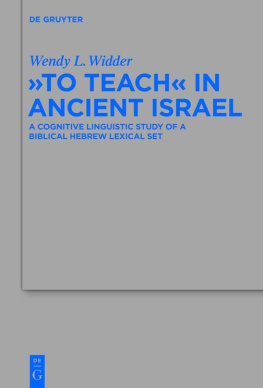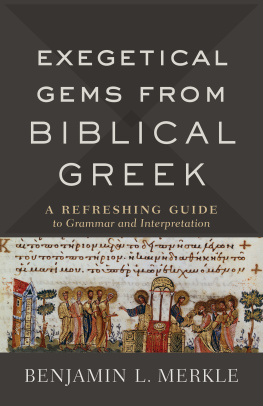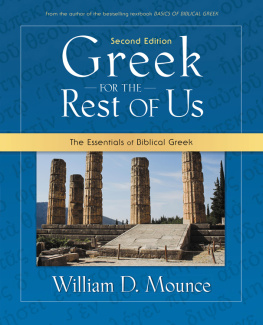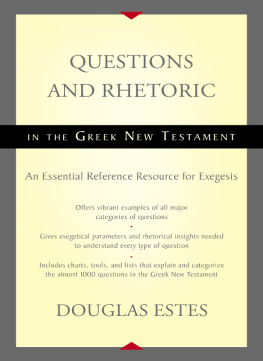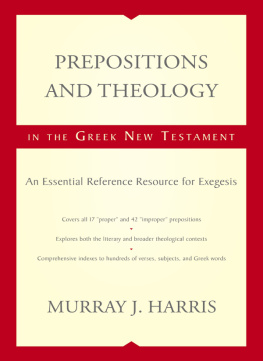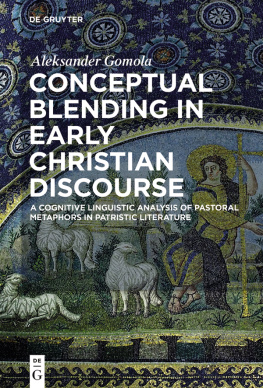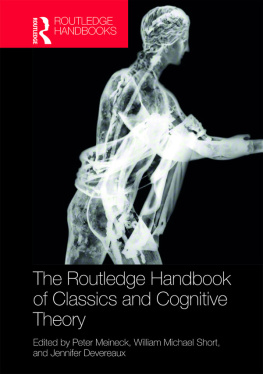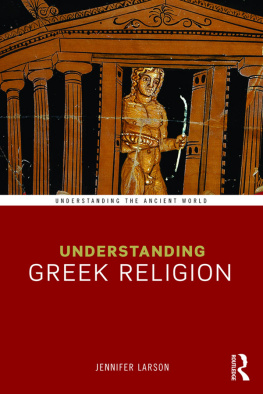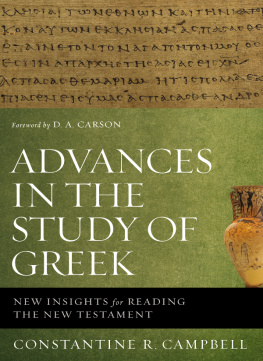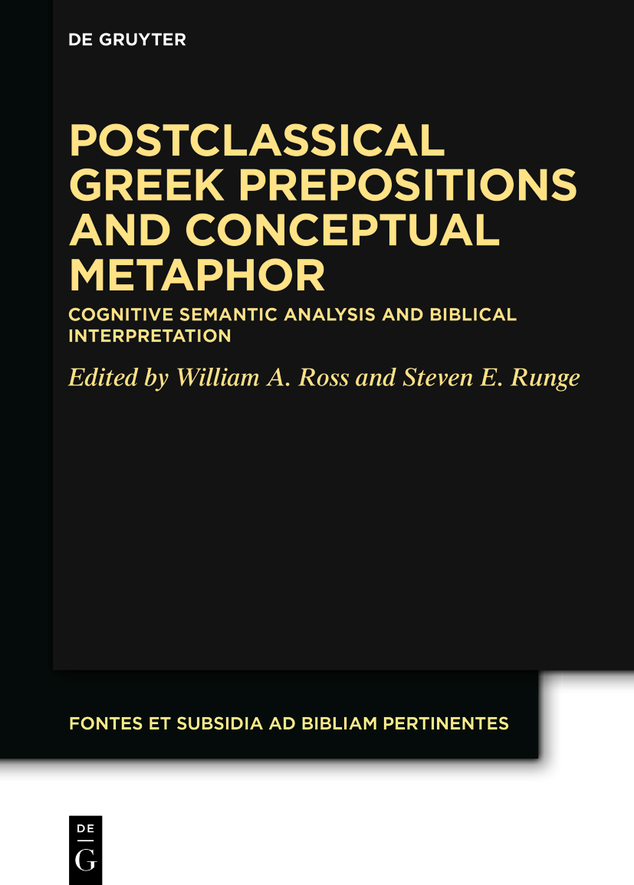Fontes et Subsidia ad Bibliam pertinentes (FoSub)
Edited by
James K. Aitken
David S. du Toit
Loren T. Stuckenbruck
Volume
ISBN 9783110774047
e-ISBN (PDF) 9783110777895
e-ISBN (EPUB) 9783110777994
Bibliographic information published by the Deutsche Nationalbibliothek
The Deutsche Nationalbibliothek lists this publication in the Deutsche Nationalbibliografie; detailed bibliographic data are available on the Internet at http://dnb.dnb.de.
2022 Walter de Gruyter GmbH, Berlin/Boston
To the scholarly community at Tyndale House, Cambridge; even those among them skeptical of linguists.
Lists of Abbreviations
1Clem.
1 Clement
AB
Anchor (Yale) Bible
ABDFreedman, David Noel, ed. Anchor Bible Dictionary. 6 vols. New York: Doubleday, 1992.
acc.
accusative
AcTActa Theologica
Anab.
Xenophon, Anabasis
Ant.Josephus, Jewish Antiquities
Ars.Eudoxus Astronomus, Ars astronomica
AST
Amsterdam Studies in the Theory and History of Linguistic Science, Series IV: Current Issues in Linguistic Theory
BAGLBiblical and Ancient Greek Linguistics
BDAG
Danker, Frederick W., Walter Bauer, William F. Arndt, and F. Wilbur Gingrich. Greek-English Lexicon of the New Testament and Other Early Christian Literature. 3rd ed. Chicago: University of Chicago Press, 2000.
BECNT
Baker Exegetical Commentary on the New Testament
Bel.Hero Mechanicus, Belopoeica
BibInt
Biblical Interpretation Series
BLG
Biblical Languages: Greek
BNTC
Blacks New Testament Commentary
BTThe Bible Translator
BZNW
Beihefte zur Zeitschrift fur die neutestamentliche Wissenschaft und die Kunde der alteren Kirche
ca.
circa
CEB
Common English Bible
Chaer.Chariton, Chaereas and Callirhoe
CLR
Cognitive Linguistics Research
Comp. Arist. Cat.Plutarch, Comparatio Aristidis et Catonis
CSB
Christian Standard Bible
CSL
Cambridge Studies in Linguistics
CTL
Cambridge Textbooks in Linguistics
dat.
dative
DGENTDelgado Jara, Inmaculada. Diccionario Griego-Espaol Del Nuevo Testamento. Salamanca: Universidad de Salamanca, 2006.
Dial.
Justin, Dialogue with Trypho
Diogn.
Diognetus
DNTB
Dictionary of New Testament Background. Edited by Craig A. Evans and Stanley E. Porter. Downers Grove, IL: InterVarsity Press, 2000.
EGLL
The Encyclopedia of Greek Language and Linguistics. Edited by Georgios K. Giannakis. 3 vols. Leiden: Brill, 2014.
Ench.
Epictetus, Enchiridion
ESV
English Standard Version
tB
tudes bibliques
GELSMuraoka, Takamitsu. A Greek-English Lexicon of the Septuagint. Leuven: Peeters, 2009.
gen.
genitive
Good PersonPhilo, That Every Good Person Is Free
Herm. Mand.
Shepherd of Hermas, Mandate
Hist.Herodotus, Histories; Polybius, Histories
HTRHarvard Theological Review
ICGuarducci, Margherita, ed. Inscriptiones Creticae. 4 vols. Rome: Libreria dello stato, 19351950.
ICC
International Critical Commentary
IG II2
Kirchner, Johannes, ed. Inscriptiones Graecae II et III: Inscriptiones Atticae Euclidis anno posteriors. 2nd ed. Parts IIII. Berlin: Walter de Gruyter, 19131940.
IG XII,7
Delamarre, Jules, ed. Inscriptiones Graecae XII,7: Inscriptiones Amorgi et insularum vicinarum. Berlin: Walter de Gruyter, 1908.
Il.
Homer, Iliad
JBLJournal of Biblical Literature
JSNTJournal for the Study of the New Testament
J.W.Josephus, Jewish War
KJV
King James Version
L1
original language
L2
target language of translation
Let. Aris
Letter of Aristeas
LHBOTS
Library of Hebrew Bible/Old Testament Studies
LM
Landmark
LSJ
Liddell, Henry George, Robert Scott, and Henry Stuart Jones. A Greek-English Lexicon. 9th ed. with revised supplement. Oxford: Clarendon Press, 1996.
LXX
Septuagint
m.
mishnah
MS(S)
manuscript(s)
MSU
Mitteilungen des septuaginta-unternehmens
NA28
Aland, Barbara, Kurt Aland, J. Karavidopoulos, Carlo M. Martini, Bruce M. Metzger, and Holger Strutwolf. Novum Testamentum Graece, 28th Revised Edition. Stuttgart: Deutsche Bibelgesellschaft, 2012.
NAB
New American Bible
NAS
New American Standard
NICNT
New International Commentary on the New Testament
NIGTC
New International Greek Testament Commentary
NIV
New International Version
NovTNovum Testamentum
NRSV
New Revised Standard Version
NS
new series
NTL
New Testament Library
NTSNew Testament Studies
OCT
Oxford Classical Texts
Od.Homer, Odyssey
OEDOxford English Dictionary. http://www.oed.com.
par.
parallel passage
pers. comm.
personal communication
PG
Patrologia Graeca. Edited by J.-P. Migne. 161 vols. Paris, 18571886.
PMGPage, Denis L. Poetae Melici Graeci. Oxford: Clarendon Press, 1962.
Pss. Sol.
Psalms of Solomon
QUD
Question-under-Discussion
RNT
Regensburger Neuen Testaments
RSV
Revised Standard Version
Sanh.
Sanhedrin
SBLGNT
Holmes, Michael W. The Greek New Testament SBL Edition. Atlanta: Society of Biblical Literature, 2010.
SCS
Septuagint and Cognate Studies
SemeiaS
Semeia Studies
SLCS
Studies in Language Companion Series
Spec. LawsPhilo, On the Special Laws
Spir. et litt.Augustine, De spiritu et littera
Superst.Plutarch, De superstitione
SVTG
Septuaginta: Vetus Testamentum Graecum
TLGThesaurus Linguae Graecae. http://stephanus.tlg.uci.edu/.
TR
Trajector
T. Sim.
Testament of Simeon
TS
Texts and Studies
TSL
Typological Studies in Language
UBS4
Aland, Barbara, Kurt Aland, C. M. Martini, and Bruce M. Metzger. The Greek New Testament, 4th ed. Stuttgart: United Bible Societies, 1968.
Vesp.
Aristophanes, Wasps
WBC
Word Biblical Commentary
WUNT
Wissenschaftliche Untersuchungen zum Neuen Testament
ZNWZeitschrift fr die neutestamentliche Wissenschaft
Introduction
William A. Ross
Steven E. Runge
This volume is the result of the Tyndale House Workshop in Greek Prepositions: Cognitive Linguistic Approaches to Lexicography and Theology, held from 30 June1 July in 2017 in Cambridge, England. The aim of that event was to apply Cognitive Linguistic approaches to Greek lexical semantics and theology, a trajectory now presented in the essays below. As the organizers of the workshop in Cambridge and now editors of the present volume, we are grateful for the partnership and support of Tyndale House, particularly the assistance and encouragement of Peter J. Williams and Simon Sykes. Furthermore, the workshop as a whole was made possible by a generous and voluntary grant from the trustees of the Sapere Family Foundation, for which we remain extremely thankful.
The workshop intentionally cultivated a multidisciplinary perspective, bringing together linguists, classicists, lexicographers, and theologians alongside biblical scholars to consider the phenomena of postclassical Greek prepositions. That same interdisciplinarity now characterizes the chapters below, appropriately reflecting the complexity and importance of the topic in view. The participation of respected scholars such as Dirk Geeraerts (Linguistics, University of Leuven) and Anne Thompson (Classics, University of Cambridge) greatly enriched the discussion during the workshop and, despite not appearing in this volume, they certainly contributed to the refinement and integration of the essays published here. The same can be said about the participation of those who attended the workshop and contributed their own expertise. We are also pleased to have included a chapter by Travis Wright that was not originally part of the workshop but that nevertheless complements the aims of this volume to stimulate further research into the semantics of postclassical Greek prepositions and its implications for biblical interpretation.


